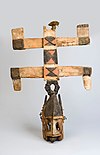Maasai religion
| Part of a series on |
| Traditional African religions |
|---|
 |
The Maasai religion is the traditional beliefs of the Maasai people of Kenya and Tanzania.
Traditional beliefs[edit]
In Maasai culture, nature and its elements are important facets of their religion.[1] Enkai (also called Engai) is the androgynous Supreme Creator, possessing both masculine and feminine principles.[2] The Maasai refer to Ngai's primordial dwelling as "Ol Doinyo Lengai" which literally means "The Mountain of God" , which they believe is in Northern Tanzania.[2]
Ngai or Enkai's name is synonymous to "rain."[3]
In Maasai religion, the Laibon (plural: Laiboni) intercedes between the world of the living and the Creator. They are the Maasai's high priests and diviners. In addition to organizing and presiding over religious ceremonies—including sacrifice and libation, they also heal the living, physically and spiritually.[4]
References[edit]
- ^ Taylor, Bron, Encyclopedia of Religion and Nature, A&C Black (2008), p. 1016, ISBN 9781441122780 (retrieved March 19, 2020) [1]
- ^ Jump up to: a b Asante, Molefi Kete; Mazama, Ama; Encyclopedia of African Religion, Volume 1, SAGE (2009), p. 427, ISBN 9781412936361 (retrieved March 18, 2020) [2]
- ^ Bergmann, Sigurd; Gerten, Dieter; Religion and Dangerous Environmental Change: Transdisciplinary Perspectives on the Ethics of Climate and Sustainability, LIT Verlag Münster (2010), p. 43, ISBN 9783643100931 (retrieved March 18, 2020) [3]
- ^ Asante, Molefi Kete; Mazama, Ama; Encyclopedia of African Religion, Volume 1, SAGE (2009), p. 428, ISBN 9781412936361 (retrieved March 18, 2020) [4]
Further reading[edit]
- Harold Scheub, A Dictionary of African Mythology, The Mythmaker as Storyteller Oxford University Press, Oxford, 2000, ISBN 0-19-512456-1
- Naomi Kipury, Oral Literature of the Maasai (1983: East African Educational Publishers Ltd., PO Box 45314 Nairobi, Kenya
- Spencer, Paul, (2003), "Providence and the cosmology of misfortune" and "Loonkidongi diviners and Prophets", in Spencer, P, Time, Space, and the Unknown: Maasai configurations of power and providence, Routledge, London (pp. 67–123).
